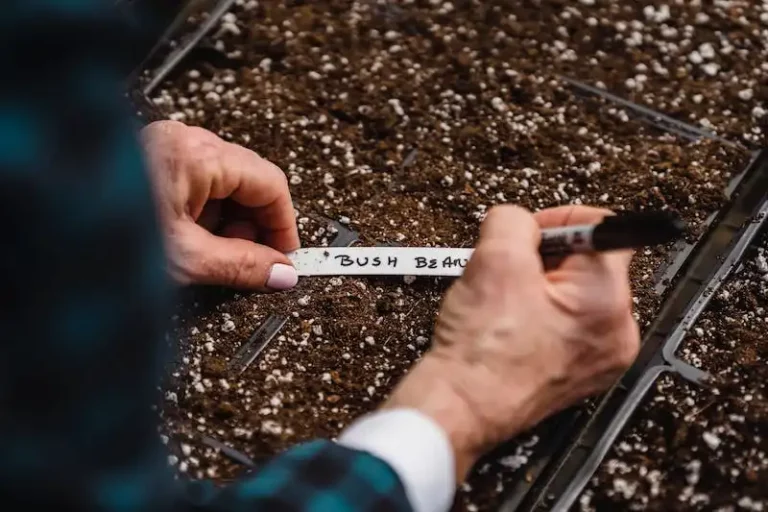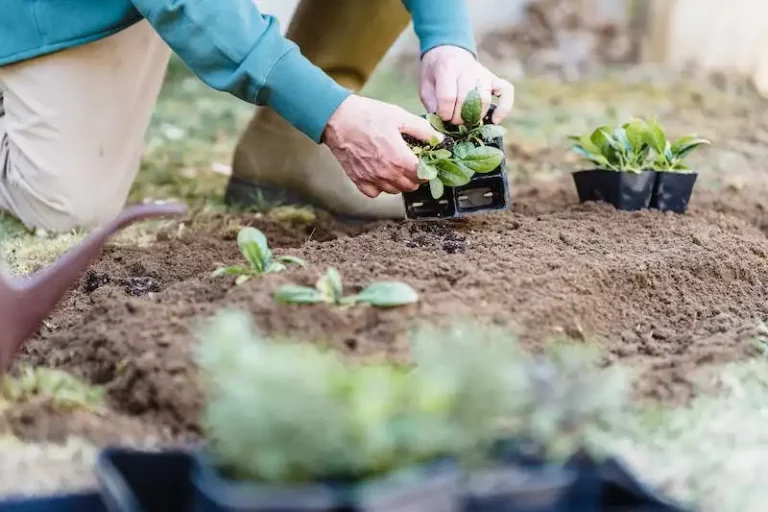Aphids can be a common problem for home gardeners. These small, soft-bodied insects can quickly multiply and infest your pepper plants, causing damage to the leaves and making it difficult for the plants to produce healthy peppers. If you spend a lot of time and effort growing your own peppers, this can be frustrating. However, there are natural ways to eliminate aphids and keep your plants healthy.
One excellent natural remedy for aphids on pepper plants is diatomaceous earth. This substance is made from the fossilized remains of tiny marine organisms, and it works by dehydrating the aphids. Simply sprinkle diatomaceous earth on the surface of the soil near your pepper plants, or directly on the plants themselves, and it will eliminate the aphids. Be sure to wear gloves and a mask when handling diatomaceous earth, as it can cause irritation to the skin and lungs.
Another natural approach to eliminating aphids is to use homemade sprays. One popular recipe involves mixing a small amount of dish soap with water and pouring it into a spray bottle. Then, spray the mixture directly onto the aphids. The soap will suffocate the insects, killing them effectively. Another homemade spray that can be effective is a mixture of garlic and chili pepper. Boil crushed garlic and chili pepper pieces in water, let it cool, then strain it into a spray bottle. Spray this mixture onto the aphids to eliminate them.
Aphids on Pepper Plants Natural Methods
Aphids are small, soft-bodied insects that can cause damage to your pepper plants. If you notice your pepper plants covered with aphids, there are several natural methods you can try to control and eliminate the infestation.
Sprays
One of the most effective ways to get rid of aphids on pepper plants is by using sprays. A simple soapy water spray can be made by mixing a few drops of dish soap with water. Spray this mixture directly on the aphids, focusing on the undersides of leaves where they often hide. The soapy water will suffocate the aphids and eliminate them.
Another effective spray is a mixture of orange peels and water. Start by steeping orange peels in boiling water for a couple of hours. Strain the liquid and let it cool down. Then, pour the infused orange peel water into a spray bottle and spray it on the aphids. The strong scent of the orange peel will deter the aphids from staying on your pepper plants.
Companion planting
Planting companion plants near your pepper plants can help prevent aphids. Some companion plants, such as foxglove or potato, release natural chemicals that repel aphids. They can also attract beneficial insects like aphidius, which are natural predators of aphids.
Diatomaceous earth
Diatomaceous earth is a natural powder made from fossilized remains of diatoms. It is an excellent remedy for controlling aphids on pepper plants. Sprinkle the diatomaceous earth around the base of your pepper plants. The tiny pieces of diatoms have sharp edges that will cut through the aphids’ exoskeleton, causing them to dehydrate and die.
Removing and preventing infestations
If you notice an aphid infestation on your pepper plants, it is important to take action promptly. Wear gloves and simply handpick the aphids from the plants. Another method is using a strong jet of water to wash the aphids off the plants. Always discard the removed aphids far away from your pepper plants to prevent them from crawling back.
To prevent future infestations, regularly inspect your pepper plants for signs of aphids. If you notice any aphids, promptly remove them using the methods mentioned above. Additionally, practicing good garden hygiene by keeping the area around your pepper plants free from weeds and debris will make it less attractive for aphids.
By following these natural methods, you can effectively control and eliminate aphids on your pepper plants without the need for harmful chemicals. Your plants will stay healthy and thrive, providing you with an abundant harvest of delicious peppers.
What Are Aphids
Aphids are small, soft-bodied insects that are a common pest in gardens and agricultural fields. They range in color from green to brown and can be found on the leaves, stems, and buds of plants. Aphids are known for their ability to multiply rapidly, with some species capable of producing hundreds of offspring in just a few weeks.
These tiny insects suck the sap from plants, which can cause stunted growth and even death in severe cases. They are particularly problematic for pepper plants, as they feed on the new growth and emerging fruits, causing deformities and discoloration. Aphids can also transmit plant diseases, such as the viral infection called Colorado potato virus.
Identifying aphids is relatively easy, as they have a distinctive pear-shaped body and two tubes called cornicles on their back end. The use of a magnifying glass can help in their identification. Despite their small size, aphids can quickly infest a plant and cause significant damage.
Getting rid of aphids can be a difficult task, but there are several effective methods for managing infestations:
- Natural predators: Encouraging beneficial insects, such as ladybugs and lacewings, can help control aphid populations. These predators feed on aphids and can reduce infestations.
- Homemade remedies: Homemade solutions, such as a mixture of water, soap, and chili powder, can be used to kill aphids. Spraying this solution on the affected plants can effectively eliminate the pests.
- Neem oil: Neem oil is a natural insecticide that can be used to control aphids. It is derived from the neem tree and works by suffocating the insects.
- Companion planting: Planting certain flowers and herbs, like marigolds and foxglove, near pepper plants can help repel aphids. These companion plants act as a deterrent and reduce the chances of aphid infestations.
- Physical removal: For smaller infestations, manually removing aphids from plants can be effective. Simply pick them off with gloved hands or wash them away with a strong spray of water.
It is important to address aphid infestations as soon as they are noticed to prevent further damage to the plants. Regular inspections and proactive management are key to keeping aphids under control and maintaining healthy pepper plants.
What Damage Do Aphids Cause To Pepper Plants
Aphids, also known as plant lice, are small insects that can cause significant damage to pepper plants. These pests feed on the sap of the plants, which can lead to stunted growth and distortion of the leaves, stems, and fruits. Aphids excrete a sticky substance called honeydew, which can attract mold and leave a sooty mold on the surface of the plants.
The damage caused by aphids goes beyond physical deformation. The honeydew left by the insects can also act as a breeding ground for sooty mold, a black fungus that can hinder photosynthesis and limit the plant’s ability to produce energy. This can result in weakened plants and reduced yields.
If left untreated, aphid infestations can quickly spread to neighboring plants and cause even more damage. It’s essential to approach aphid management in a timely and efficient manner to prevent further harm to your pepper plants.
Fortunately, there are various ways to control and eliminate aphids from your pepper plants. One simple and natural approach is to use a homemade insecticidal soap. You can mix a few drops of mild liquid dish soap with water and spray the solution onto the affected plants. The soapy solution coats the aphids and suffocates them, effectively killing the pests without causing harm to the plants or the environment.
Another effective method of aphid control is by introducing beneficial insects to your garden. Ladybugs, lacewings, and parasitic wasps are natural predators of aphids and can help keep their populations in check. Bringing these insects into your garden can help prevent aphid infestations and promote a healthy ecosystem.
Additionally, diatomaceous earth and neem oil are commonly used methods for controlling aphids. Diatomaceous earth is a powdery substance made from the fossilized remains of tiny aquatic organisms. When sprinkled on the surface of plants, it penetrates the soft-bodied insects, causing them to dehydrate and die. Neem oil, derived from the neem tree, acts as a natural insecticide and disrupts the aphids’ reproductive cycle. Both of these methods provide excellent results in eliminating aphids from pepper plants.
When dealing with aphids, it’s essential to wear gloves to protect your hands from contact with the pests. Regularly inspecting your plants for aphid infestations and promptly taking action is the key to preventing severe damage. If you spot aphids on your pepper plants, there are different ways to address the issue before it becomes a more significant problem.
A simple homemade remedy for smaller infestations is to mix a teaspoon of baking soda with water and pour it into a spray bottle. This solution can be sprayed onto the plants, effectively killing the aphids. Another remedy is to crush pieces of orange peel and scatter them around the base of the plants. The smell of citrus deters aphids and can help control their population.
Companion planting can also be an effective way to prevent aphids from infesting your pepper plants. Growing certain plants, such as marigolds, dill, and tomatoes, near your peppers can help repel aphids. These plants release natural chemicals that act as insecticides, making them excellent companions for peppers.
In conclusion, aphids can cause significant damage to pepper plants, affecting their growth, health, and yield. Identification of aphid infestations is essential to prevent overkill and ensure effective pest control. Using natural remedies, introducing beneficial insects, and implementing preventive measures are all key components of managing aphids and keeping your pepper plants healthy.
How To Get Rid Of Aphids On Peppers
If you notice that your pepper plants are covered with aphids, there are several ways to effectively get rid of them. Aphids are small, soft-bodied insects that feed on the sap of plants, including pepper plants. They can cause damage to your plants by sucking out their juices and spreading diseases. Here are some methods you can use to eliminate aphids on peppers:
1. Soap and Water: One of the simplest and most effective ways to get rid of aphids is by using a soap and water spray. Mix a solution of water and a few drops of dish soap, and spray it onto the infested areas of your pepper plants. The soap will suffocate and kill the aphids.
2. Companion Planting: Planting certain types of companion plants, such as orange or chili peppers, can help deter aphids from infesting your pepper plants. Aphids prefer certain plants, so planting a variety of them can confuse and discourage the aphids from settling on your peppers.
3. Homemade Sprays: There are homemade sprays you can make to control aphids on peppers. For example, a mixture of crushed garlic, hot pepper flakes, and water can help repel aphids. Another option is to mix neem oil with water and spray it on your pepper plants. These homemade sprays can effectively kill and repel aphids without harming beneficial insects.
4. Diatomaceous Earth: Sprinkling diatomaceous earth on the surface of your pepper plants can also help eliminate aphids. Diatomaceous earth is made from the fossilized remains of tiny aquatic organisms and has sharp edges that damage the exoskeletons of insects, causing them to dehydrate and die.
5. Insecticidal Sprays: If the infestation is severe and other methods have failed, you can use insecticidal sprays specifically designed to control aphids. These sprays contain chemicals that kill aphids on contact. However, be cautious when using insecticides, as they can be harmful to beneficial insects and can also pose a risk to your health if not used properly.
By applying these different methods, you can effectively control and eliminate aphids on your pepper plants. Remember to regularly inspect your plants for signs of aphids and take action at the first signs of infestation to prevent the aphids from causing too much damage. Following a proactive approach to pest control will help keep your plants healthy and thriving.



